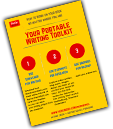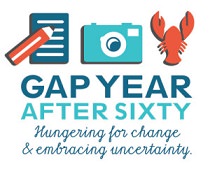What you can write in 15 minutes a day
 Writing a (short) book may be on your bucket list. But we’re deep into August in the U.S., peak time for summer vacation.
Writing a (short) book may be on your bucket list. But we’re deep into August in the U.S., peak time for summer vacation.
If you’re not splayed out on your hammock or a beach chair, you’re probably chomping to leave work early.
Why not ignore your BIG WRITING PROJECT for the rest of the summer because you just don’t have time?
That’s one way to approach it.
I’d like to suggest another.
Write for 15 minutes a day
If you can spare 6 minutes to brush your teeth (includes flossing), you know you can find 15 minutes to write. But what can you accomplish by writing for 15 minutes a day?
– Writers write. If you write every day, you are a writer.
– You can chip away at a large writing project.
– Writing every day keeps the momentum going.
– You ward off writer’s block.
– Fool yourself. Get more creative because the stakes are low.
– Sometimes your 15 minutes turns into 30 minutes or an hour.
– Studies show that short bursts of writing can be very productive
What counts as writing?
Don’t get too precious about it. Perfection is not the goal. Anything you write counts as part of your 15 minutes.
That said, it helps if you establish a writing “practice,” much like a yoga practice.
When you take a yoga class, you get on your mat and move through a sequence of asanas or poses.
Some days it feels hard. You feel creaky and inflexible. Other days you’re in the flow.
But if you get on your mat, your muscle memory kicks in and you know what to do.
By setting up a writing practice every day at the same time, you create the same sort of reflexive approach to writing.
Maybe it’s at the kitchen counter first thing in the morning. (Like this blog post I’m writing.)
Maybe it’s at 11 PM right before you go to bed.
What you can write in 15 minutes
– Jot down an outline
– Brainstorm titles for your book (get crazy)
– Write a paragraph where you explain the motivation behind your book
– Tell your reader what your book will do for them
– Explain how you can be of service to your reader
Use writing prompts and do freewriting*
Also known as journaling, freewriting is a proven technique to unlock your ideas and dig deeper into what you are really thinking. Here are a few ideas for writing prompts from famed author and writing coach Natalie Goldberg:
– Write about the specific moment you are in. As Goldberg puts it: “Tell about the quality of the light coming in through your window.”
– What is your first memory?
– Write about “leaving.” (This could be divorce, leaving the house or a friend dying, Goldberg explains.)
– Grab a book of poems and open to any page. Choose one line and write it down. Then rewrite and explain it.
– Be specific. Slow down in your mind.
My Beta Author writing program launches next month
If you want company, structure and motivation to help you write a short book, mark your calendar for September and October. I will be offering a new and improved version of my Beta Author program.
*Freewriting and establishing a daily writing practice are key components of my approach to writing.
Spots to work with me 1:1 will be limited due to my Gap Year After 60.
More details soon.


 Want to reinvent your life and work after age 60? Follow Sam and me as we reinvent a yin yang life on the coast of Maine and in Brooklyn.
Want to reinvent your life and work after age 60? Follow Sam and me as we reinvent a yin yang life on the coast of Maine and in Brooklyn.







